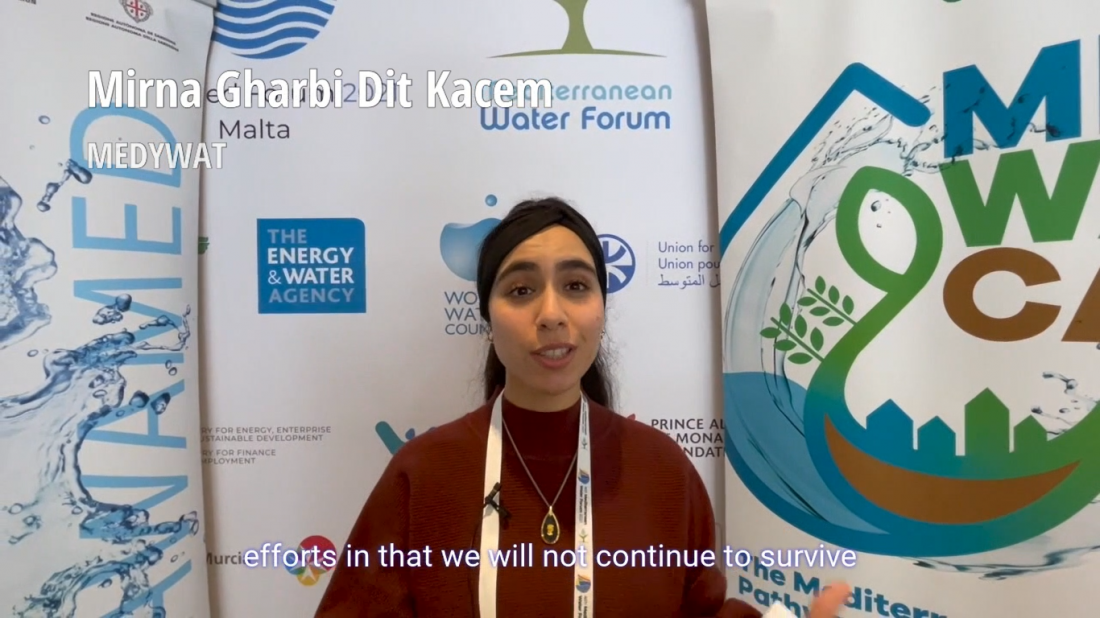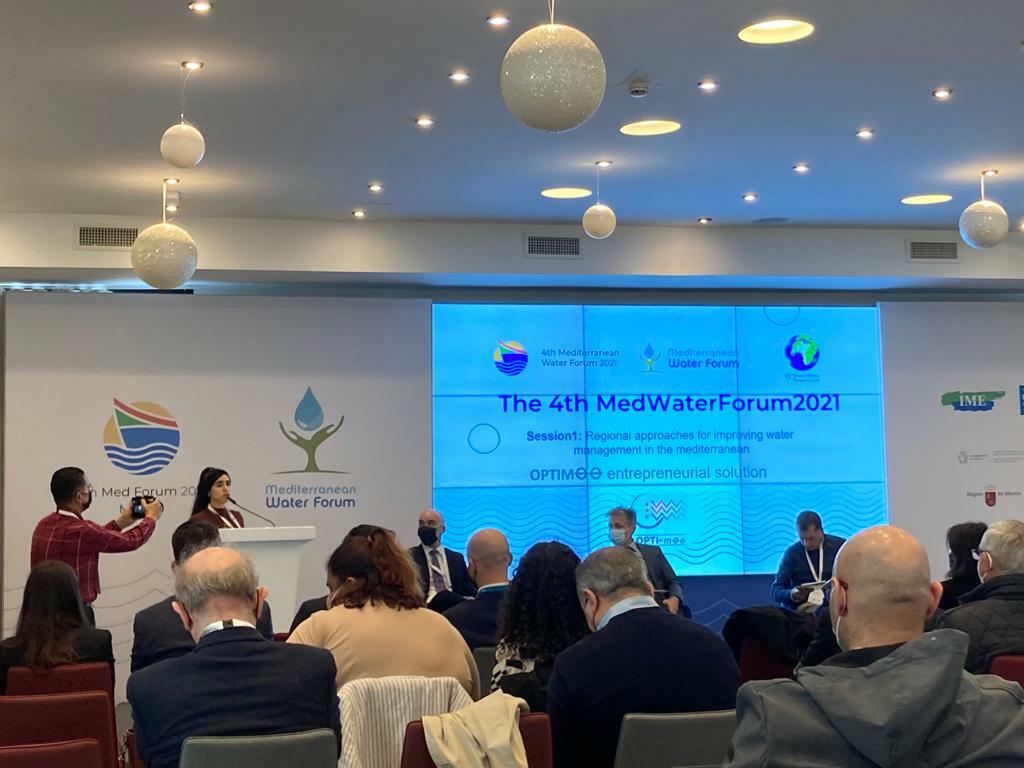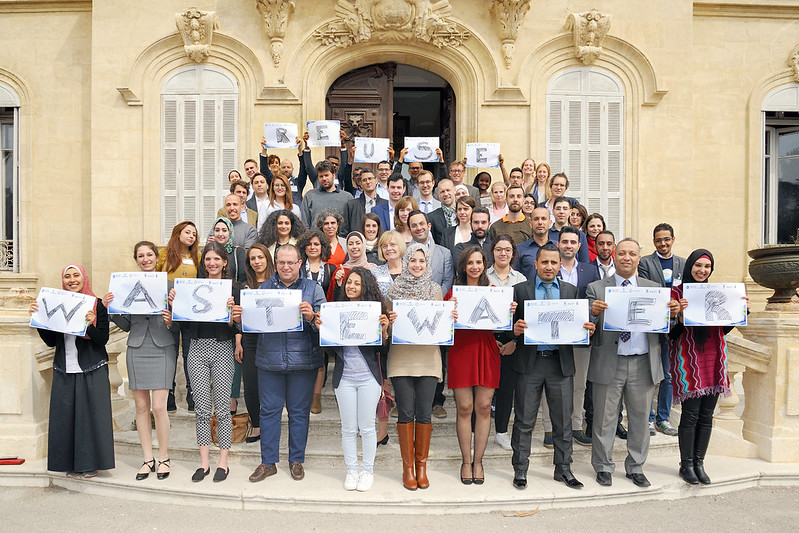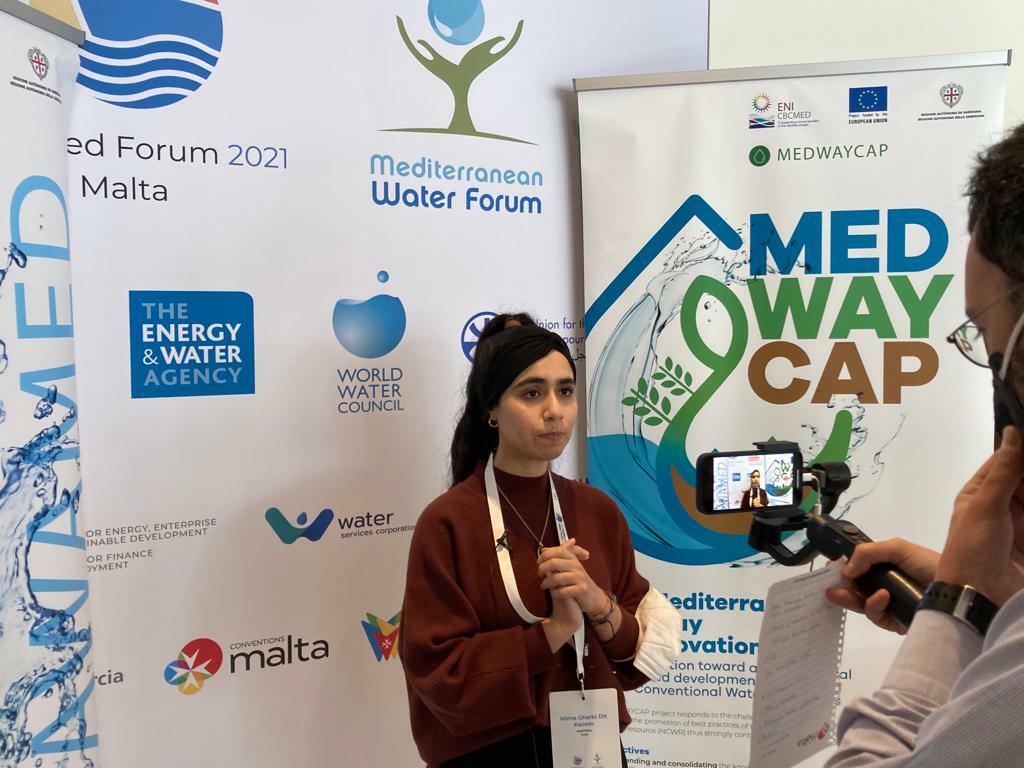NAWAMED: “Put attention to non-conventional solutions, co-operate and invest in the potential of our capacities to find a common goal”, MirnaGharbi Dit Kacem, Mediterranean Youth for Water Network

The Euro-Mediterranean Centre for sustainable development– SVI.MED, partner in NAWAMED and MEDWAYCAP projects, attended the 4th Mediterranean Water Forum (MWF) in Malta last December to share its knowledge and establish new connections with potential international partners. A set of interviews with a number of speakers were conducted during the event to identify ways to promote innovative solutions and technologies that can improve water efficiency, starting with the reuse of treated wastewater.
The MWF has been organized by the Water&Energy Agency - EWA of Malta, partners with SVI.MED in both projects, the Institut Méditerranéen de l’Eau - IME and the Union for the Mediterranean– UfM.
We all know that ecosystems are changing, mainly aquatic and land ecosystems: this may be caused by different factors that are interconnecting. Certainly, these changes are directly and indirectly influencing our lives, and l the different actors of sustainable development.
Sadly, if we don't find alternatives, and put efforts in that, we will simply fail to survive…

Mirna Gharbi Dit Kacem works for MedYWat, The Mediterranean Youth for Water Network: a network of young water professionals from across the Mediterranean region, supported by the Center for Mediterranean Integration (CMI). MedYWatwas launched by CMI in March 2017 during the first World Water Day regional youth workshop on “Youth Innovating with Wastewater for a Sustainable Mediterranean” (Marseille, France), and it has been growing ever since.

Source: CMI Marseille, Youth Innovating with Wastewater for a Sustainable Mediterranean
I would say that non- conventional solutions for water management are one of the alternatives, or one of the solutions that we should focus on. To be clear: we need to put more attention to this solution, and co-operate together to invest in the potential of our capacities to find a common goal. It's really important to continue surviving, living in peace and in better conditions.
Since these solutions are often stopped, it is important to understand which are the barriers: they may be cultural, financial, political. However, probably all of these factors are interconnected.
The whole approach should be more harmonic I would say. If we don’t be willing to do that, and better understand its functioning, we won’t really succeed in promoting the non-conventional water resources

We need to start with training and educating ourselves by promoting capacity-building campaigns. Is it possible to find some strength points in this issue?
The strength of promoting non-conventional water solutions is finding alternatives for the challenges we are facing on all the surrounding factors, like climate change for example.
In other words: we are trying to find a way of adaptation. So, we can really work towards the Sustainable Development Goals, and achieve an inclusive development in the world, if we want to talk on an international level.
But the strength lays also in the fact that we are creating a platform for different stakeholders, from different backgrounds, who are active actors in the different disciplines. The mission is to open for them the doors to actively cooperate together.
Subsequently, we will be able to promote for better governance in different countries, which is one of the main challenges.
If we focus on the leverages, maybe the majority of the experts would vote for political and legislative ones.
But I would add competency, skills and education. We don't think about the differences between us. Differences lose their significance if we want to achieve these objectives. Thus, we need to focus on these objectives, without focusing on the details that are insignificant.
One problem is represented by the gap between the urgency of working on environmental crisis, and the common perception. That is the gap between present and future.
Actually, we are working a lot on sustainable development and sometimes we feel like
it is not well understood. If we go deeper into the exact definition of sustainable development:
we can identify the direct and clear link between present and future. That is: we are trying our best to manage and preserve the present resources for the future generations.
I see that, on the contrary, there is a link, not a gap between present and future, because we are living today to manage the different axis of sustainable development including the socioeconomic factors, the scientific and technological ones, towards achieving and responding to the future generations’s needs that may be our children.
The MWF enabled both NAWAMED and MEDWAYCAP projects to gain a better understanding of the pathway to strengthen the value and impact of innovative integrated Non-Conventional Water Resources management solutions through a Mediterranean Alliance for a collective learning towards effective policies and innovation processes.
Dreaming is made for people who want to fail, that's why we think we should keep setting objectives and working towards these objectives, setting questions and working hard to convert them into actions.
Watch a clip of the video interview here









